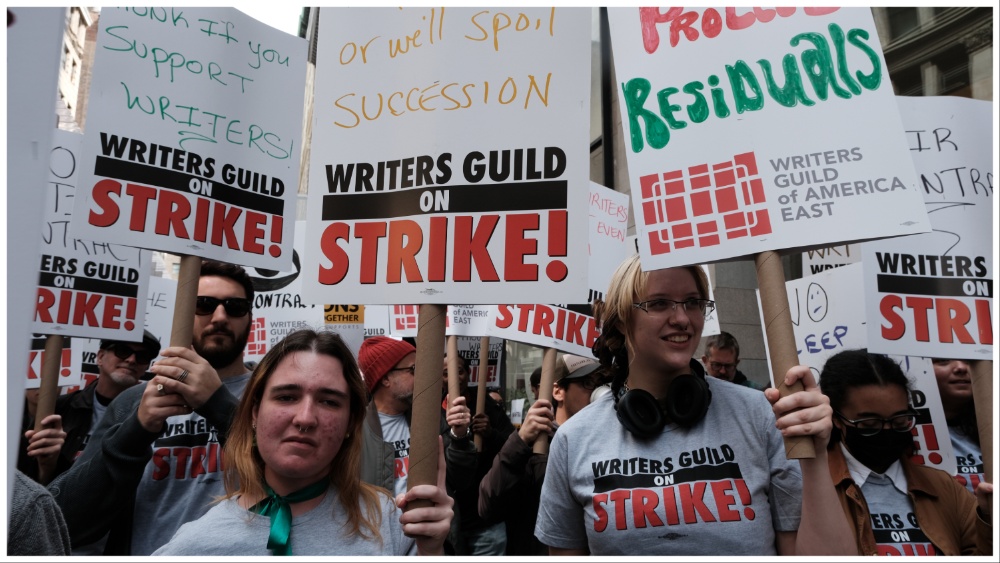
The breakdown of the Writers Guild of America’s contract negotiations with the Alliance of Motion Picture and Television Producers could benefit the documentary industry. Especially those documentary filmmakers with projects seeking distribution.
At least that’s the hope.
Like film and television scribes worried about the survival of screenwriting as a viable profession, hundreds of nonfiction filmmakers with independently made docus are grappling with the streamers’ new distribution landscape, which, for the most part, no longer includes acquiring titles that aren’t commissioned.
If the writers strike lasts for several months, the thought is that not only broadcast networks but also streaming companies will begin to face holes in their narrative content, which could, in turn, lead to the purchase of indie docus to fill the void.
At the Hot Docs film festival in Toronto, documentary producers, programmers and filmmakers are not only celebrating independently made fare but also contemplating the effects the writers strike could have on the nonfiction industry.
“The data shows that when there have been writers strikes, or certainly during COVID, we had an uptick in demand for non-fiction programming,” said Geralyn White Dreyfous, co-founder of doc fund Impact Partners. “You combine the media consolidation, along with cutbacks in staffing and budgets, and it still seems pretty tight. But my hope is that buyers will turn to nonfiction because there are a lot of great films that still haven’t been sold.”
Impact Partners has two films at Hot Docs seeking distribution – Alexandria Bombach’s “It’s Only Life After All,” about the Indigo Girls, and Penny Lane’s “Confessions of a Good Samaritan” about kidney donation.
Following a Hot Docs Industry panel discussion about creative distribution, filmmaker and author Jon Reiss said that while he stands “firmly” with the Writers Guild, he does see potential in the strike for docus.
“Last time a writers strike happened, reality TV came into the forefront,” Reiss said. “Now we have reality TV coming out our ears. So, hopefully, there will be other forms of documentary content that will come (to the forefront) like doc series, which is good for me because I’m actually about to pitch one in about two months.”
Hot Docs Industry programs director, Elizabeth Radshaw, added: “I would be ignoring history to see that past strikes have been beneficial for the documentary community with regards to sales and the return of buyers’ attention to our work. Certainly, given the current market space, that would be very delightful attention that we feel we deserve. We never wish bad upon our wonderful fiction creators, and we want a speedy resolution, but a lot of documentaries and long-form series are out there that deserve to have a profile and a platform.”
But unlike the 2007 writers strike, when networks cut seasons short and aired reruns, streamers have years worth of content in the pipeline along with international shows written by scribes outside the WGA.
“It seems like people are hoping that the writers strike has a similar effect to COVID in giving documentaries and nonfiction more opportunities because of the halt on production for fiction projects,” says documentary producer, and the founder of Motto Pictures, Julie Goldman. “I think there are two key factors which will limit this situation: one is it’s unlikely that the strike will go on for a long time, and the other is that there was time to prepare because no one was taken by surprise (by the strike).”
Goldman is at Hot Docs with two docus, “Love to Love You, Donna Summer” and “The Eternal Memory.” Both films have distribution with HBO and MTV Documentaries, respectively.
“I think there will likely be a programming gap, and that will require the re-shuffling of schedules, which I hope will be an opportunity for the many documentaries that haven’t yet sold in the past year,” Goldman adds. “We have to see how long the strike lasts before we see a shift in the landscape.”
Fair wages and contracts are not only a concern for Hollywood scribes. Doc filmmakers, no matter how successful, often spend their entire careers fighting for budgets that include adequate salaries.
“I am sure most documentary makers would stand in support of writers being paid fair, sustainable wages,” says Oscar-winning producer Joanna Natasegara (“The White Helmets”). “It’s something our community struggles with, too. It would be great if money was spent more equitably in general in the industry, and that would include investment at all levels in many of the beautiful docs emerging this year by bringing them to global audiences that clearly want them.”
Gathr founder and CEO Scott Glosserman, who is at Hot Docs with Oliver Stone’s “Nuclear Now,” isn’t sure if the writers strike will lead to more sales, but he thinks it will lead to more nonfiction production.
“I was writing a script for Paramount in 2007 when the writers strike happened, and I ended up going off and making a documentary called “Truth in Numbers? Everything, According to Wikipedia,” Glosserman said. “Time will tell how it all plays out.”













